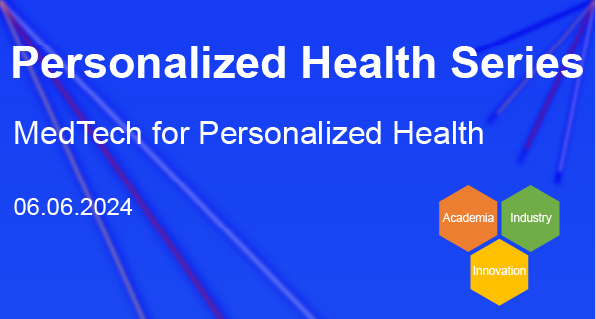Workshop "MedTech for Personalized Health"
On the 6th of June, the 5° joint workshop of the Personalized Health Series between University of Basel, University Hospital Basel and industry, took place in Allschwil, and was this time focused on “MedTech for Personalized Health”. Organized by Personalized Health Basel with the support of the Innovation Office of the University of Basel, the event saw the participation of more than 45 people with a very diversified background. Attendees exchanged and discussed in order to bridge the gap existing between the academic and the industry world, and thus to foster possible cooperation, to create innovation for the greatest benefit of the patients.
The format, as on other occasions, has been designed to foster exchanges and enrich the discussion.
The two keynotes provided the audience with examples of successful running collaborations in the field of MedTech:
- Philippe Cattin from the University of Basel, briefly showed some of the recent advances in surgery planning in virtual reality (VR) and modelling of diseases. He focused on the important aspect of translational medicine, stressing how the general research path cannot correctly feed what he called the “Innovation Circle”, that lead to potential clinical applications. His journey along the “steep” slopes of medical certifications to qualify a medical device software drew the attention of the people in the audience, many of whom were confronted to similar issues.
- Daria Rukina and Paul Delmar from Roche and Alexis Tricot from Sysnav showed how synergies of complementary skills can bear fruits. In this collaboration, the competences of Sysnav in reconstructing position and movement, associated to Roche medical expertise improved the precision in measuring the movements of patients affected by multiple sclerosis. And such precision is critical to detect the possible effects of an administered drug.
The keynote lectures were followed by an effervescent pitching session during which some of the attendees showcased the projects they are working on.
The session was opened by Bram Stieltjes who presented the clinical data warehouse (DWH) that was set up at the University Hospital Basel (USB) to make the data from many applications operated at the USB available for further secondary use (such as research, quality improvement and controlling). These data may be also used to test and improve medical devices and those algorithms presiding over their functioning.
The other speakers of the pitching session were:
- Krisztina Schmitz-Grosz / Michael Göttinger, Medgate “CGM - understand more about your individual health & use it optimal”
- René Gilvert, OptiChroniX, “Navigating Cognitive Health: Leveraging Digital Solutions for Improved Care”
- Erik Schkommodau, FHNw, ”Next steps in Surgical Navigation”
- Linus Kao, Skyvormed, “Incorporating medtech and digital into pharma trials”
- Sanja Tomovska, Quant Biomarkers AG, “Mission in Precision Health: Awareness for Action”
- Bernard Ludwig, Preciphos, “Multiplex Analysis of Biological Samples by Means of Biosensor chip-arrays. First results and Foreseen Applications”
The closing panel session, moderated by Carine Poussin from CSEM, saw the three panelists Lisa Falco from the Zühlke Group, Enkelejda Miho from FHNW, and Peter Speyer from the Novartis Foundation sparkling discussing on how to harness the power of collaborations and partnerships in the MedTech and AI/LLM field. Regarding the key factors for successful collaborations a few take-home messages were:
1) Finding the right partner is key as well as trust, transparency and education. Misalignement between the parties involved in the collaboration is a big obstacle.
2) When service providers are involved, one should take the opportunity to learn from them.
3) Public-private partnerships (PPP) should be incentivised.
4) Uncertainties derived from new technologies and new regulation bring challenges but also new opportunities for collaborations.
5) Small hospitals, like the ones in Switzerland, represent a great opportunity where small start-ups, academia and hospitals can work together and shape the regulatory aspects while developing the products.



